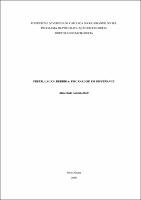| Share record |


|
Please use this identifier to cite or link to this item:
https://tede2.pucrs.br/tede2/handle/tede/6660Full metadata record
| DC Field | Value | Language |
|---|---|---|
| dc.creator | Boff, Almerindo Antônio | - |
| dc.creator.Lattes | http://buscatextual.cnpq.br/buscatextual/visualizacv.do?id=K4772002P9 | por |
| dc.contributor.advisor1 | Souza, Ricardo Timm de | - |
| dc.contributor.advisor1Lattes | http://buscatextual.cnpq.br/buscatextual/visualizacv.do?id=K4760725Y7 | por |
| dc.date.accessioned | 2016-05-10T13:24:07Z | - |
| dc.date.issued | 2016-03-03 | - |
| dc.identifier.uri | http://tede2.pucrs.br/tede2/handle/tede/6660 | - |
| dc.description.resumo | Ao criar a psicanálise, a partir do final do século XIX, Freud dedicou-se a explicitar os fundamentos epistemológicos em que alicerçava sua pretensão de haver criado uma nova ciência, um novo ramo das ciências naturais, com as quais ela compartilhava, portanto, tanto estes fundamentos epistemológicos quanto sua Weltanschauung. Em meados do século XX, e agora a partir da crítica à cientificidade da psicanálise provinda especialmente da epistemologia neopositivista, coube a Jacques Lacan retomar a questão da epistemologia da psicanálise para alicerçá-la sobre outros fundamentos. A presente tese procura evidenciar que, após a abordagem lacaniana do problema, vem de fora da psicanálise, mais precisamente da filosofia de Jacques Derrida, uma maneira original de conceber a psicanálise. Para Derrida, a psicanálise não apenas não cabe toda dentro dos limites de uma ciência regional, como vem a constituir, em harmonia com a grafemática derridiana, uma maneira original de pensar a constituição da realidade em geral. A tese percorre os caminhos da crítica derridiana à epistemologia freudiana e à psicanálise estruturalista lacaniana dos anos 50 do século XX, até encontrar-se com o pensamento contemporâneo que busca, no último Lacan pelo campo da psicanálise, e em Alain Badiou pelo campo da filosofia, a fundamentação destas no campo da formalização matemática. Além de permitir pensar uma nova epistemologia da psicanálise alicerçada em sua filosofia, a tese acompanha Derrida ao apontar para os desafiadores rumos de uma psicanálise por vir. | por |
| dc.description.abstract | In creating psychoanalysis, at the end of the 19th century, Freud dedicated himself to explain the epistemological foundations in which he grounds his assumption of having created a new science, a new branch of natural sciences, with which it shared these epistemological foundations as well as its Weltanschauung. In mid-twentieth century, originating at the critique of psychoanalytical scientificity that came especially from neopositivist epistemology, it fell to Jacques Lacan to resume the question of psychoanalytical epistemology and to consolidate it over new foundations. The present thesis seeks to highlight the fact that, after the lacanian approach to the issue, an original way of conceiving psychoanalysis comes from outside of the psychoanalytical field, more precisely from Jacques Derrida’s philosophy. According to Derrida, psychoanalysis not only doesn’t fit in its entirety within the limits of a regional science, but it also comes to constitute, in harmony with derridean graphemathics, an original way of viewing the constitution of reality in general. The thesis follows the path of derridian critique to freudian epistemology and to lacanian structuralist psychoanalysis of the 1950’s, regarding the contemporary thought that seeks, in the last Lacan through the psychoanalytical field, and in Alain Badiou through the field of philosophy, the foundations of both in the fields of mathematical formalisation. Other than allowing to conceive a new psychoanalytical epistemology consolidated in his philosophy, the thesis follows Derrida in pointing at the challenging paths of a psychoanalysis to come. | eng |
| dc.description.provenance | Submitted by Setor de Tratamento da Informação - BC/PUCRS ([email protected]) on 2016-05-10T13:24:07Z No. of bitstreams: 1 TES_ALMERINDO_ANTONIO_BOFF_COMPLETO.pdf: 1424543 bytes, checksum: c5fc6845e6654e6a216e1767b6bd2718 (MD5) | eng |
| dc.description.provenance | Made available in DSpace on 2016-05-10T13:24:07Z (GMT). No. of bitstreams: 1 TES_ALMERINDO_ANTONIO_BOFF_COMPLETO.pdf: 1424543 bytes, checksum: c5fc6845e6654e6a216e1767b6bd2718 (MD5) Previous issue date: 2016-03-03 | eng |
| dc.format | application/pdf | * |
| dc.thumbnail.url | http://tede2.pucrs.br:80/tede2/retrieve/164777/TES_ALMERINDO_ANTONIO_BOFF_COMPLETO.pdf.jpg | * |
| dc.language | por | por |
| dc.publisher | Pontifícia Universidade Católica do Rio Grande do Sul | por |
| dc.publisher.department | Faculdade de Filosofia e Ciências Humanas | por |
| dc.publisher.country | Brasil | por |
| dc.publisher.initials | PUCRS | por |
| dc.publisher.program | Programa de Pós-Graduação em Filosofia | por |
| dc.rights | Acesso Aberto | por |
| dc.subject | EPISTEMOLOGIA | por |
| dc.subject | DERRIDA, JACQUES - CRÍTICA E INTERPRETAÇÃO | por |
| dc.subject | FREUD, SIGMUND - CRÍTICA E INTERPRETAÇÃO | por |
| dc.subject | LACAN, JACQUES - CRÍTICA E INTERPRETAÇÃO | por |
| dc.subject | BADIOU, ALAIN - CRÍTICA E INTERPRETAÇÃO | por |
| dc.subject | PSICANÁLISE | por |
| dc.subject | FILOSOFIA | por |
| dc.subject.cnpq | CIENCIAS HUMANAS::FILOSOFIA | por |
| dc.title | Freud, Lacan, Derrida : psicanálise em différance | por |
| dc.type | Tese | por |
| Appears in Collections: | Programa de Pós-Graduação em Filosofia | |
Files in This Item:
| File | Description | Size | Format | |
|---|---|---|---|---|
| TES_ALMERINDO_ANTONIO_BOFF_COMPLETO.pdf | Texto Completo | 1.39 MB | Adobe PDF |  Download/Open Preview |
Items in DSpace are protected by copyright, with all rights reserved, unless otherwise indicated.




